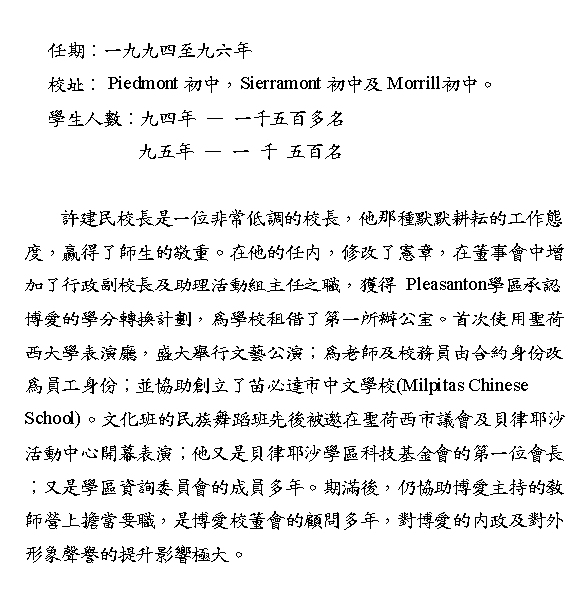 
|
 |
|---|
 |
|---|
|
A SWOT Analysis of BCS by James Hsu Like a business corporation, BCS also needs to be concerned with its existence and future growth. This article is a personal attempt to look at these issues from a SWOT (Strengths, Weaknesses, Opportunities, and Threats) point of view.
1. Strengths Attending to BCS is not compulsory. Parents send their children to BCS because they want their children to learn Chinese language and culture. Most students are brought up in a family that speaks Chinese. Therefore, students can understand (listen and speak) Chinese. This background makes teaching Chinese less challenging. BCS is a school administered by parents. There is always a group of parents volunteering their time to run various activities for the school without receiving any compensation. The core group of these parents has contributed their time and knowledge over an extended period of time. BCS enjoys a good relationship with the local school district. Being the largest Chinese organization in Berryessa, BCS supports various activities in the local community activities and has won respect and reputation in Berryessa and San Jose.
2. Weaknesses Running a school with BCS's size (approximately 1,400 students and 100 teachers) is a very complex task and it requires many people's work and coordination. BCS never has enough parent volunteers to run the school. Most of the parent volunteers who come forward to work for BCS have a fulltime job on weekdays. They can only work on BCS tasks on a part time basis. Some key members of these parents carry a heavy BCS workload beside the duties to their family and the fulltime job. All parent volunteers are not professional educators/administrators. They should be proud of what they have achieved. Since BCS meets only on Saturdays, communication and coordination among its members are limited. Students come to BCS to attend class only and have a diminishing interest in involving with BCS' activities. The bonding between fellow students and students towards BCS is not string as they grow to adulthood.
3. Opportunities The popularity of the Internet allows distance learning more accessible. BCS should not only be prepared for this, but also take a more active role in cyberspace. There are great opportunities for technology supported improvements in teaching and learning. BCS is one of the largest Chinese schools in U.S. It can also become on of the best Chinese schools in academics. Raising the minimum academic standard at each class, implementing the grade-retention system for poor academic performance, hiring the best teacher in the Bay Area, etc., BCS can become one of the best schools in U.S. Because BCS is a Saturday school and most parents drive their children to school, there is a good opportunity that BCS can organize the parents in various activities and establish a good and close relationship with them.
4. Threats What impact will information technology have on BCS' future? Will BCS sill exist when students can learn Chinese from the Internet? To answer these questions, we should first differentiate the five differentiate the five functions BCS plays: a). Teaching and learning Chinese language and culture. 2). Credentialing. 3). Providing a place for "networking". 4). Strengthening the Chinese community in the Bay Area. 5). Enriching the multicultural environment in the local community. It is unlikely that all of these functions can be provided by a 'virtual' school in cyberspace. In recent years, several high schools and community colleges started offering Chinese language classes. Their tuition is either free or low when compared to BCS' tuition. Even if they become popular in the future and have large enrollment, BCS still has lots to offer for k-8 students. In the last twenty years, BCS has grown from forty students to 1,400 students and from one to three campuses. But the school's basic structure (school administrators are parent volunteers, classes are for K-12 grades on weekends, BCS is a non-profit independent community school) is not changed. Some of the problems BCS faces today are due to this basic structure. What changes does BCS need to adapt to the ever-changing world? How can BCS make a successful change? These issues will continuously challenge the BCS leaders in the years to come. |
|
|